Lactation and menstrual cycle
The cycle in women of reproductive age has different durations, which normally range from 21 to 35 days. It is known that the first day in the cycle coincides with the beginning of menstruation.
There are two phases in each cycle. During the follicular phase, several follicles grow under the influence of FSH, actively synthesizing estrogens. One follicle undergoes full development and becomes dominant. Hormones of the first phase are necessary for the growth of the endometrium, into which the fertilized egg is implanted after fertilization.
Approximately in the middle of the cycle, as FSH accumulates, a surge of LH is observed, leading to rupture of the membranes of the dominant follicle and the release of a mature egg. Fertilization can take place over the next 1-2 days. The follicle membranes contribute to the formation of the corpus luteum, which produces the pregnancy hormone progesterone. It supports the development of the embryo and fetus in the first weeks after successful conception. If pregnancy does not occur, the corpus luteum regresses before the next menstruation.
While breastfeeding, the nature of your periods changes. Lochia or postpartum discharge is not considered menstruation. In the absence of lactation or rare breastfeeding of the baby, menstruation may resume after the end of lochia.
When and how do you get your first period after childbirth?
The completion of postpartum discharge is not a signal for the resumption of the cycle, it is only the starting point of the final stage of recovery. And all because a woman’s hormonal background changes after childbirth. Let us dwell on the course of this important process in a little more detail. During pregnancy and breastfeeding, a young mother actively produces prolactin, the hormone responsible for the production of breast milk. However, prolactin has one more property: it inhibits the production of hormones that ensure the development and release of the egg. That is, theoretically, as long as there is a lot of prolactin, there will be no menstruation. In practice, it doesn’t turn out quite like that, because in addition to the hormonal background, which is unique for each person, there are other factors that influence the restoration of the cycle:
- heredity (as practice shows, the resumption of menstruation in women of the same family, but of different generations, occurs, plus or minus, at the same time);
- pathologies of various properties (including those associated with diseases of the pelvic organs);
- method and timing of feeding the baby.

Breastfeeding affects a woman’s hormonal levels, and therefore the timing of the resumption of menstruation.
If breastfeeding is practiced
When the baby begins to receive complementary foods and supplements, prolactin will begin to gradually decrease. Based on this premise, we conclude that if a woman is breastfeeding, then the starting point for expecting menstruation will be 4–6 months.
This is interesting. If a woman produces a lot of prolactin, then even when there are 1-2 feedings per day left, menstruation can begin only after final weaning and restoration of hormonal levels.
If a woman does not breastfeed
In this case, the young mother’s body does not need a large amount of prolactin, that is, the end of lochia, as well as the healing of the incision on the uterus in the case of a cesarean section, is the starting point for the resumption of the cycle, that is, 1.5 months after the birth of the child. Although 4-5 months without regulation is not considered a violation.
This is interesting. If, in the absence of lactation, 5 months after giving birth you still do not have your period, this is a signal to urgently consult a doctor.

If, due to the absence of lactation, menstruation does not last longer than five months, you need to consult a doctor
When does menstruation begin during breastfeeding?
Menstruation when breastfeeding may be absent for a long time if the child is on full breastfeeding. After the introduction of complementary foods or artificial feeding, the number of feedings is reduced, which contributes to the resumption of menstruation.
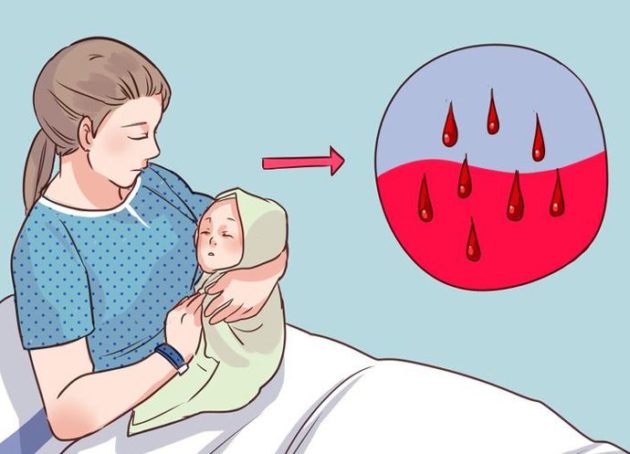
Lactational amenorrhea can be observed for more than a year, which is considered normal. Menstruation is completely absent during this period. Since the maturation of eggs in the ovaries is not observed, pregnancy cannot occur, including through unprotected sexual intercourse.
Reference! Menstruation resumes earlier during lactation in dark-haired women with average build.
On average, the restoration of the menstrual cycle after childbirth occurs after 6-12 months, regardless of the presence of breastfeeding.
Menstruation while breastfeeding
Critical days during lactation can change their character, which is associated with the formation of the cycle and the effect of prolactin. Menstruation during breastfeeding after cesarean section does not have any distinctive features.
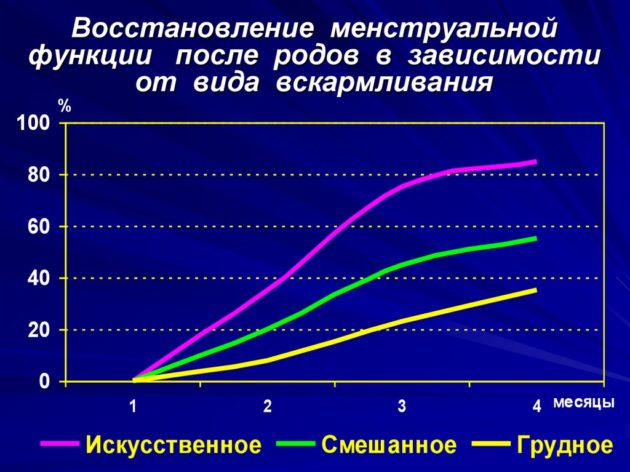
Heavy periods after childbirth while breastfeeding
Often, periods after childbirth during breastfeeding are characterized by the presence of heavy bleeding. Their increase may be associated with increased ovarian function.
Important! With heavy, prolonged bleeding, there is a risk of developing iron deficiency anemia, which is especially dangerous during lactation.
Scanty periods after childbirth while breastfeeding
Sometimes the first menstruation is characterized by slight spotting associated with high prolactin levels and frequent feedings. As a rule, after 2-3 months the cycle returns to normal.
Irregular periods after childbirth while breastfeeding
Many women note that periods during breastfeeding are irregular. The cycle may be unstable, which is normal. Typically, restoration of the duration and regularity of the cycle takes 2-3 months.
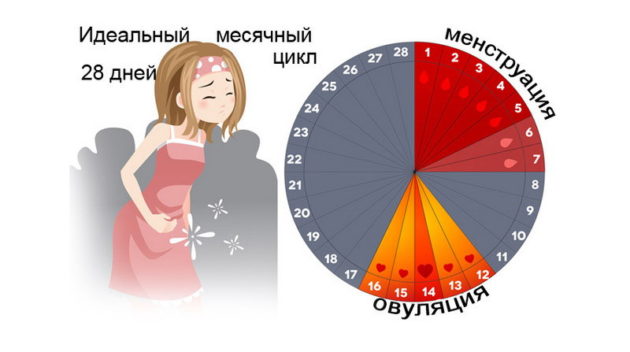
Delayed menstruation during breastfeeding
Delayed menstruation with breastfeeding may occur during the first cycles after the resumption of ovarian function. This is due to the restoration of the menstrual cycle.
If a woman is sexually active without contraception, a pregnancy test must be performed. Lactation is not always accompanied by a lack of ovulation. A negative test in the event of a missed period while breastfeeding will help rule out possible conception.
Attention! The absence of menstruation one year after childbirth against the background of stable lactation is not considered a delay.
Why don't you have periods while breastfeeding?
Menstruation during stable lactation may be absent for 1-2 years. This is not a cause for concern if the woman is healthy. As complementary foods are introduced and the number of feedings is reduced, the menstrual cycle will gradually restore. After stopping breastfeeding, menstruation returns within approximately 9-10 weeks.
The appearance of the first discharge: conditions and period

A long rehabilitation of the body takes place in the body of a young mother who has given birth. The first stage of this process is the reduction of the uterus to its pre-pregnancy state and size through contraction. It lasts 1-2 months.
Do you get your period when it is restored? In the first days, the mother experiences bloody discharge. Many people think that these are the first critical days, but this is not so. These are lochia. The reason for their appearance is placental abruption. This discharge is especially strong in the first 5-7 days, the total duration is up to 40 days. Towards the end of the course the color changes to pale yellow. Mothers should know that ovulation may occur at this time; during sexual intercourse, you need to remember about contraception.
According to The Womanly Art of Breastfeeding: 8th (pp. 364-366), almost all mothers who breastfeed their children are menstrually free for 3-6 months or longer. This is called lactational amenorrhea. [1]
Doctors say that having sex before the end of the uterine contraction process is unsafe and can lead to serious problems. Within 2-3 months after giving birth, it is recommended to visit a gynecologist to make sure everything is in order and whether you can return to a full sexual life.
Timing for the return of menstruation
It is impossible to say exactly when your first period should come. The expected time of their arrival varies greatly and depends primarily on whether the woman is breastfeeding or not. When the baby is fed formula and there is no milk, the uterus returns to its original size faster, and, accordingly, menstruation begins earlier. Breastfeeding and menstruation are interconnected, which is due to the natural postpartum processes in the body of a new mother.
Breastfeeding ensures the production of prolactin, a hormone that stimulates and regulates milk production and also stops the onset of ovulation. Can I get my period if the hormone is produced? Yes, menstruation can occur during lactation, but they come later - during the period when the child’s diet is expanded or the baby is completely switched to formula feeding. At the same time, the amount of prolactin produced by the female brain is sharply reduced.
In 70% of cases, the first period after childbirth during breastfeeding comes no earlier than six months later. The process of complete rehabilitation of the cycle is gradual. The first menstruation is irregular. Therefore, it is difficult to say whether they will be long or abundant. The postpartum course of menstruation changes dramatically. Unbearable pain disappears, the discharge is now more or, conversely, less severe, when compared with the critical days before pregnancy.
A completely different time frame for the arrival of the first menstruation awaits a mother whose child is on artificial or mixed feeding. In this case, you should expect your first menstruation 5-6 weeks after birth. [2]
Regardless of the baby’s type of nutrition, menstruation will not begin for the first two months: until the process of complete restoration of the uterus is completed.
Irregular menstruation
The process of rehabilitation of the body and its return to the pre-pregnancy state is gradual, so irregular periods (both during breastfeeding and when feeding the baby with formula) are the norm. They differ from each other in duration and interruptions for the first 2-3 months after their onset.
If there is a long delay and during breastfeeding your periods suddenly stop with active sexual activity without protection, you definitely need to do a test and check whether this is another pregnancy.
Other reasons for delays and periods not returning for too long after breastfeeding:
- stress;
- lack of rest;
- diseases;
- heredity.
Menstruation after cesarean section with breastfeeding (IV)
After a CS, the waiting time for the arrival of the first critical days does not differ from the period after physiological birth and lactation. The only difference is the abundance of lochia - their volume after CS can reach up to 0.5 liters. This is much more than after a natural birth. After a CS, complications often arise that affect the course of the critical days, including:
- Too little discharge is one of the signs of blood stagnation in the uterus due to insufficient contractions.
- Long absence of cycle stability.
- Early cessation of lochia may indicate a bending of the uterus.
- A pungent odor is a sign of infection of the reproductive system.
- Itching and discharge with a cheesy consistency are the first symptoms of thrush.
In addition to lactation and method of birth, there are several other factors that influence the time of the onset of menstruation after childbirth:
- woman's age;
- nutrition and lifestyle;
- lack of rest;
- complications while carrying a child;
- chronic diseases.
Women who give birth after 30 years of age take a little longer to recover. This does not indicate any deviations in health. Excessive stress or poor lifestyle choices also affect the balance of hormones. This leads to both loss of milk and the approach of critical days, as well as interruptions in the cycle and their later onset.
How to induce menstruation during breastfeeding
Prolonged absence of menstruation due to lactation sometimes causes women to feel anxious. Gynecologists say that lactational amenorrhea is a normal physiological process that does not require treatment.
The resumption of menstruation occurs at different times. The frequency of applications is essential, especially at night. Lactation is often accompanied by the onset of menstrual periods 1-2 years after delivery.
To induce menstruation, breastfeeding must be reduced or completely stopped. A woman can consult a doctor to prescribe medications. You can use folk remedies only after consulting a specialist.
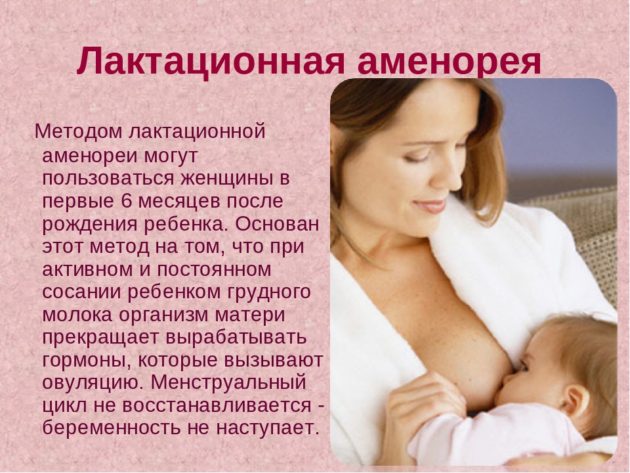
Important! WHO recommends exclusive breastfeeding for the first 6 months of the baby. It is advisable to continue breastfeeding until the child reaches 2 years of age.
How do periods affect breastfeeding?
Sometimes there is pain and burning in the nipple area due to their sensitivity due to hormonal changes. With regular breastfeeding, lactation is stable, and the amount of breast milk during menstruation does not decrease.
Can milk disappear if menstruation starts?
The only condition for maintaining adequate lactation is regular breastfeeding. Breast milk is produced in response to suckling. Special teas and foods that stimulate lactation are auxiliary methods and are often ineffective.
Sometimes the disappearance of milk is associated with lactation crises, which are temporary. Breast milk may stop being produced for a few hours or 1-2 days. However, frequent applications help eliminate this physiological problem.
Does the taste of breast milk change during menstruation?
Some women mistakenly believe that during menstruation, breast milk becomes bitter. This opinion is associated with the restless behavior of a breastfed baby.
Contrary to popular belief, the resumption of menstruation does not affect the taste of mother's milk. The child's possible anxiety is due to a new combination of hormones in the mother during her period. Your nipples may become more sensitive. During menstruation, breast milk is released from the ducts worse.
Causes
There are many reasons for a lactation crisis. Before proceeding with the correction of this condition, it is necessary to find out its exact nature.
In medical terminology, there is the concept of “lactation crisis”. This condition has its own timing and is not a pathology. Under normal conditions, lactation crises occur at 3-6 weeks of the postpartum period, as well as at 3, 7, 11, 12 months of the baby’s life. If this process does not drag on for a long time, then there is no reason to panic.
In other situations, various factors can cause a decrease in lactating function.
- Psycho-emotional problems
A common reason for the complete or partial absence of breast milk is psychological instability caused by emotional overload, stress and a tense situation in the family. The cause of psycho-emotional instability can also be the woman’s own fear of a sudden loss of milk. In this situation, the best solution to the problem is psychological help from loved ones.
- Delayed breastfeeding
Modern criteria for proper breastfeeding is placing the baby to the breast immediately after birth. The main advantage of this approach is the stimulation of the production of hormones responsible for the lactation process.
If for a number of reasons a woman was unable to put her baby to her breast in a timely manner, then there is a high risk of problems with the amount of milk produced and the duration of the lactation period.
- Feeding by the hour
The tactic of feeding a child by the hour is erroneous, and leads not only to a decrease in lactation function, but also to serious problems in the newborn’s body. Feeding the baby on demand is the “golden mean”, ensuring a normal flow of breast milk and protecting the newborn from malnutrition and overeating.
- Late introduction of complementary foods
Fearing that the baby is not receiving the required amount of nutrients, a nursing woman may begin introducing complementary foods untimely. Filling nutritional gaps with special formulas provokes inhibition of breast milk production in the mammary glands.
- Hormonal contraceptives
Taking medications containing the hormone estrogen for contraception also helps reduce lactation function in a woman.
Restoring menstruation after childbirth while breastfeeding
Restoration of menstrual function is sometimes accompanied by changes in the duration, intensity and nature of bleeding. In most cases, these phenomena are considered as a variant of the norm. However, if concomitant pathological signs appear, a consultation with a gynecologist may be required.
If a woman feeds her baby strictly at set hours, menstruation may begin 2 months after birth. If there are no critical months during the year, you should use contraception and regularly take a pregnancy test. Ovulation without menstruation is sometimes observed during breastfeeding. Timely examination and examination also helps to exclude hyperprolactinemia.
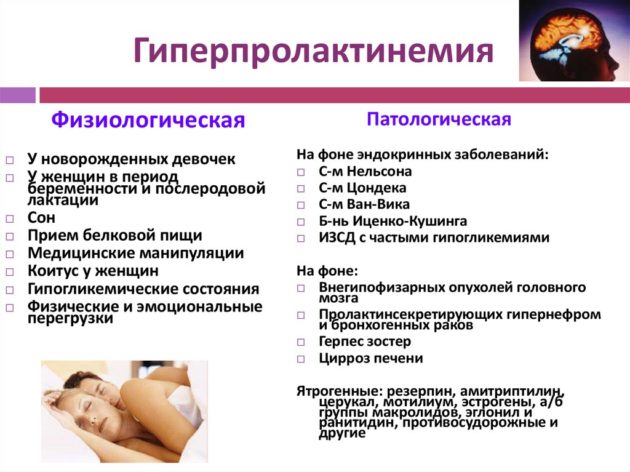
Critical days after childbirth during breastfeeding, which are of a mixed nature, usually occur 4 months after birth. The first bleeding may be profuse. If there are clots and significant blood loss, it is necessary to exclude pathology.
Spotting may appear due to decreased prolactin production. The speed of menstruation restoration depends on the following factors:
- lack of sleep,
- assistance from relatives in caring for the child,
- postpartum depression,
- nutritional adequacy,
- age and medical history of the woman,
- complications during childbirth.

Irregular menstruation does not have to be constant. Scanty or heavy discharge is possible only during the first cycles. Severe pain often indicates infection or excessive contractile function of the myometrium.
Determining the norm
After childbirth, which took place naturally, as well as through cesarean, there is heavy discharge in the form of uterine-type bleeding. They may resemble menstruation in nature, but the blood clot contains dead tissue epithelium, dirt and mucus.
Immediately after natural childbirth, lochia occurs for 6-8 weeks. After cesarean section, the duration of discharge can be 9-10 weeks. This is the norm, and deviations are not considered if the period is 5 weeks.
Heavy discharge lasts approximately 1-1.5 months , after which within a few days you can notice a sharp darkening of the blood and the presence of clots. This means the uterus is healing. After a caesarean section, the suckers that suddenly stop indicate the presence of an infection. A peculiar smell, consistency and abnormal sensations (burning, heaviness in the abdomen, pain) indicate inflammation.
What should the discharge be like after childbirth - scanty or heavy?
The discharge that comes after childbirth should be heavy for 2 weeks while the scars heal. The color is bright, the smell is characteristic - not like during menstruation, but during simple bleeding. Any stitches that were placed (internal and external) will be felt for 3-5 months. External healing occurs within 3-4 weeks. There should be no bleeding. If uterine bleeding occurs, consult a doctor immediately. Blood serums, hormonal treatment and suppositories are needed.
Hormones will stop the bleeding, normalize the nature of discharge, and oxytocin will allow lactation to continue. If for some reason you do not want to breastfeed, let us know on the second day after birth - they will give you an anti-clotting injection to irritate the mucous gland.
Then the milk will disappear, and menstruation will come immediately after the end of lochia . You should not be afraid of discharge “not like everyone else” only if you are confident in your health. A doctor, and only he, can tell whether this is normal for your body or not. The absence of a cycle or a sudden stop of bleeding also indicates pathologies.
In what cases should you consult a doctor?
Also, you should not be happy if the bleeding that began during breastfeeding lasts too long. Discharges that are short in duration indicate the presence of dead endometrium that could not come out along with the baby's place; with long durations, you are at risk of endometritis and an infectious process due to suppuration of living tissues.
This is more dangerous than the first case. If during natural childbirth one can observe a picture of the beginning and cessation of menstruation, then after cesarean this indicates deviations, since the uterus itself could not clear itself of epithelium, and hence an abscess and improper restoration of the uterus.
Reviews about menstruation while breastfeeding
Reviews from breastfeeding women indicate that the timing of the resumption of menstruation is ambiguous.
Valeria Sergeevna Klimenkova, 31 years old, Sverdlovsk Menstruation after giving birth while breastfeeding began almost 2 years later. Within a few days, severe pain appeared in the ovary area. I went for an ultrasound examination, where ovulation was confirmed. The child was on breastfeeding for almost 3 years. A significant part of the time I fed on demand. Anastasia Viktorovna Romanovskaya, 30 years old, St. Petersburg I have been breastfeeding for only 5 months, and my period has already started. There were no signs, the amount of milk did not decrease. My breasts just became more sensitive. Elena Fedorovna Stepuk, 28 years old, Vladivostok I got my period while breastfeeding when the baby was almost a year old. Six months after giving birth, I started using contraception, since I am not planning a pregnancy yet.










